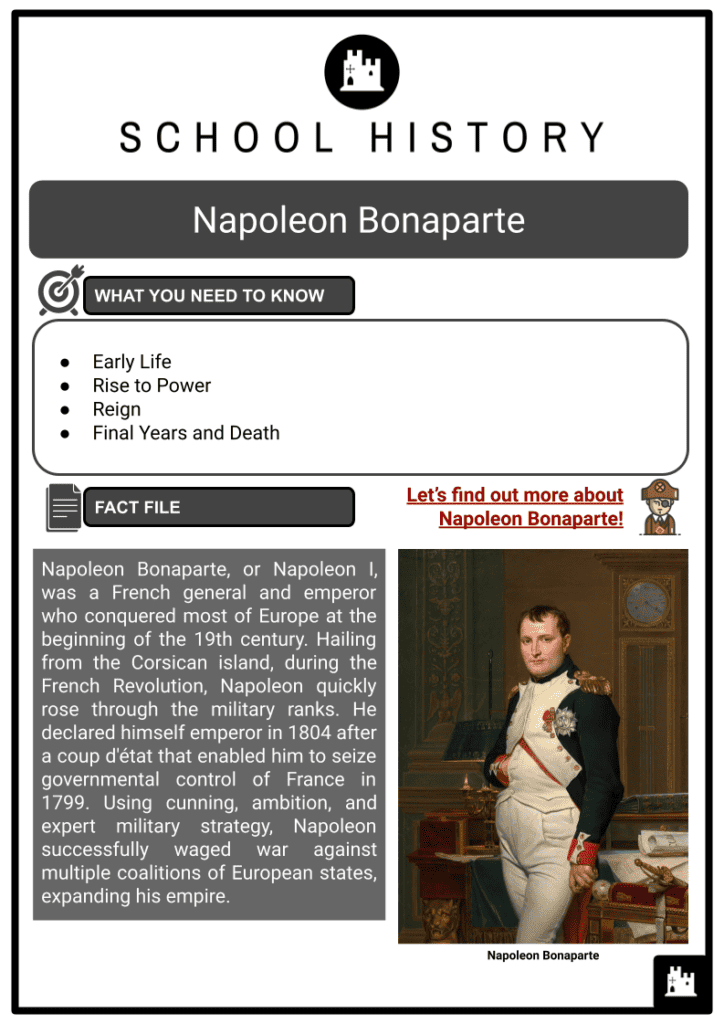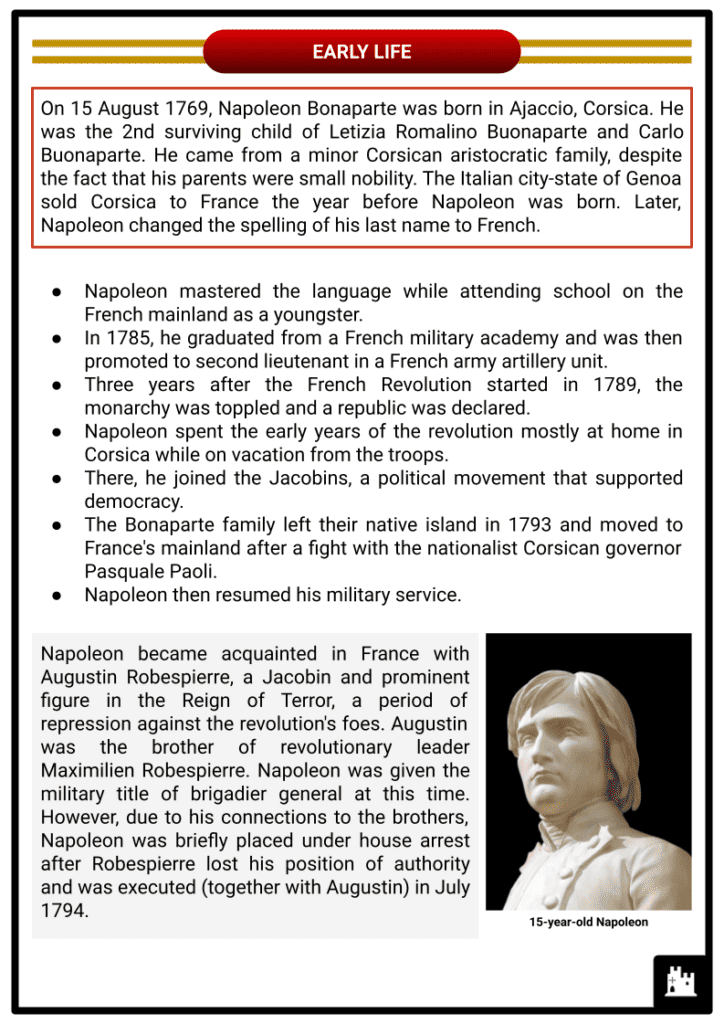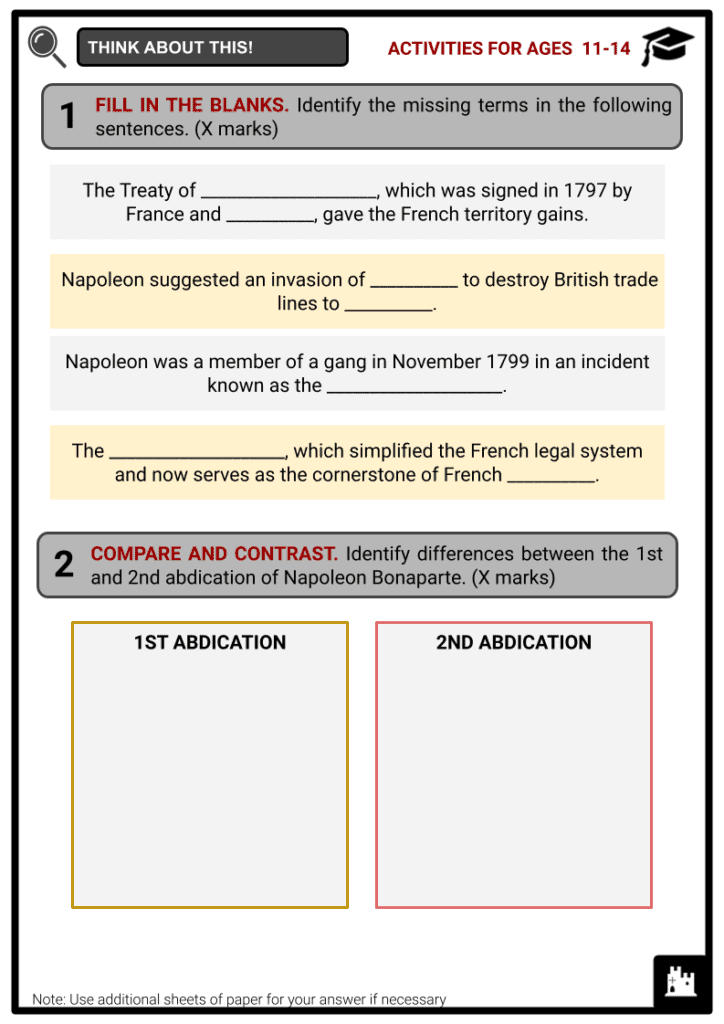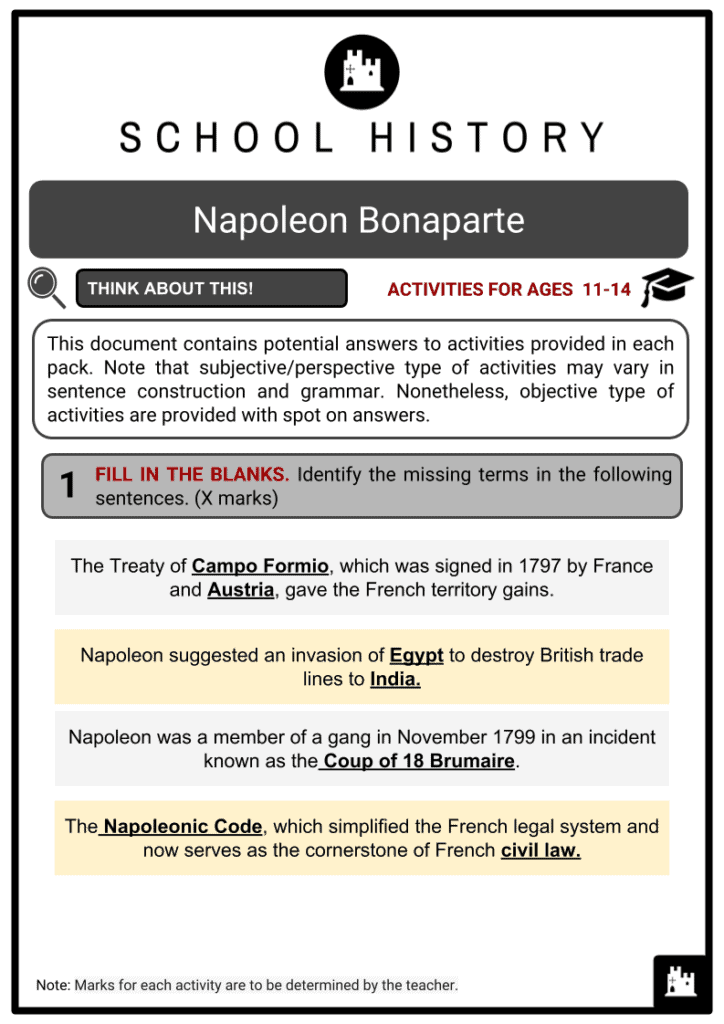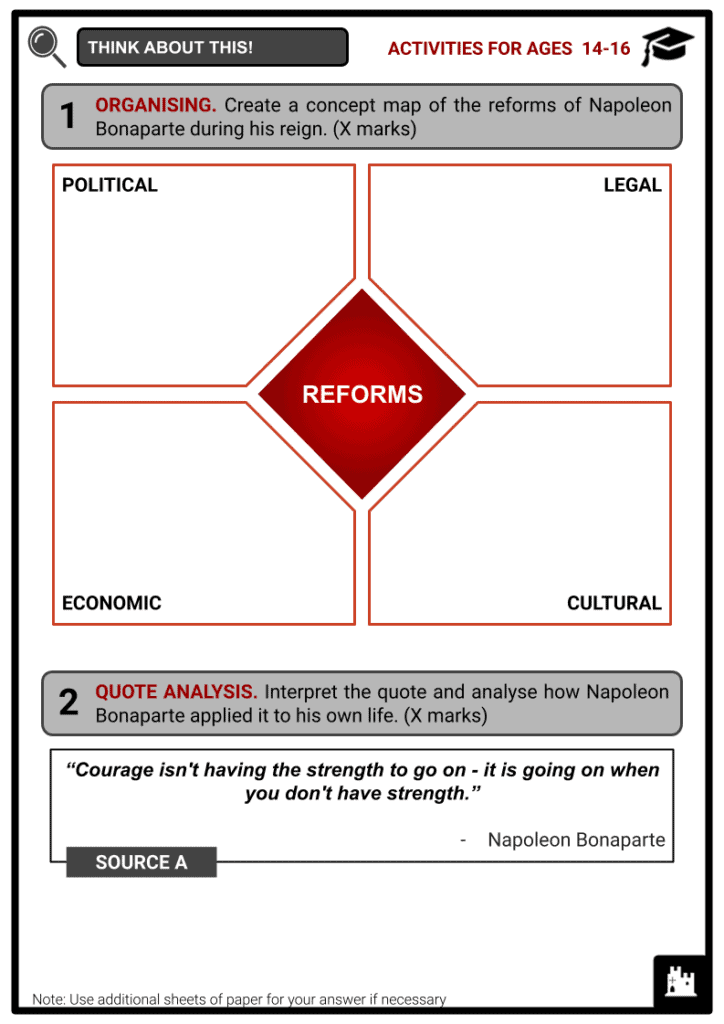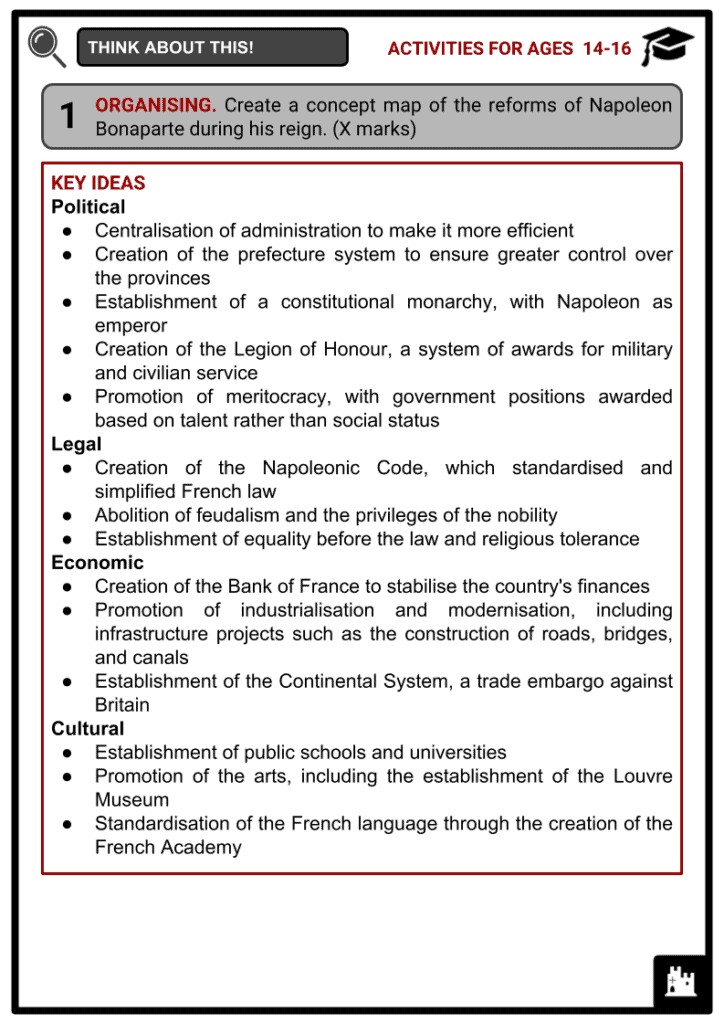Napoleon Bonaparte Worksheets
Do you want to save dozens of hours in time? Get your evenings and weekends back? Be able to teach about Napoleon Bonaparte to your students?
Our worksheet bundle includes a fact file and printable worksheets and student activities. Perfect for both the classroom and homeschooling!
Summary
- Early Life
- Rise to Power
- Reign
- Final Years and Death
Key Facts And Information
Let’s find out more about Napoleon Bonaparte!
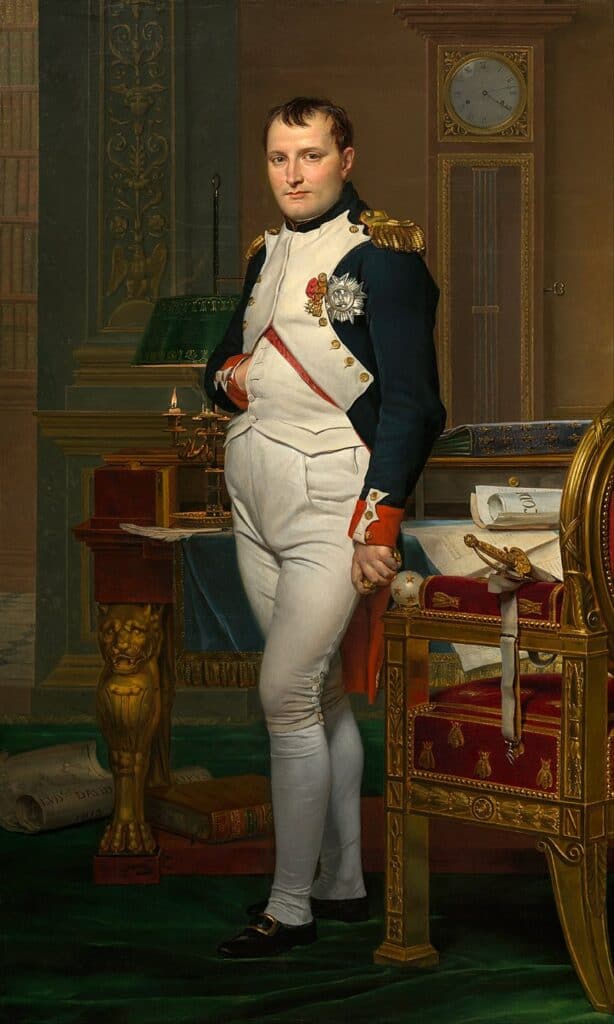
Napoleon Bonaparte, or Napoleon I, was a French general and emperor who conquered most of Europe at the beginning of the 19th century. Hailing from the Corsican island, during the French Revolution, Napoleon quickly rose through the military ranks. He declared himself emperor in 1804 after a coup d'état that enabled him to seize governmental control of France in 1799. Using cunning, ambition, and expert military strategy, Napoleon successfully waged war against multiple coalitions of European states, expanding his empire.
EARLY LIFE
- On 15 August 1769, Napoleon Bonaparte was born in Ajaccio, Corsica. He was the 2nd surviving child of Letizia Romalino Buonaparte and Carlo Buonaparte. He came from a minor Corsican aristocratic family, despite the fact that his parents were small nobility. The Italian city-state of Genoa sold Corsica to France the year before Napoleon was born. Later, Napoleon changed the spelling of his last name to French.
- Napoleon mastered the language while attending school on the French mainland as a youngster.
- In 1785, he graduated from a French military academy and was then promoted to second lieutenant in a French army artillery unit.
- Three years after the French Revolution started in 1789, the monarchy was toppled and a republic was declared.
- Napoleon spent the early years of the revolution mostly at home in Corsica while on vacation from the troops.
- There, he joined the Jacobins, a political movement that supported democracy.
- The Bonaparte family left their native island in 1793 and moved to France's mainland after a fight with the nationalist Corsican governor Pasquale Paoli.
- Napoleon then resumed his military service.
- Napoleon became acquainted in France with Augustin Robespierre, a Jacobin and prominent figure in the Reign of Terror, a period of repression against the revolution's foes. Augustin was the brother of revolutionary leader Maximilien Robespierre. Napoleon was given the military title of brigadier general at this time. However, due to his connections to the brothers, Napoleon was briefly placed under house arrest after Robespierre lost his position of authority and was executed (together with Augustin) in July 1794.
- Napoleon Bonaparte was a rising military authority in France in 1795 during the time of the French Revolution. He was promoted to major general at this time for his crucial part in quelling a royalist uprising against the revolutionary government in Paris. His rise to prominence and influence in French politics and society was furthered by this occasion.
- Napoleon married Josephine de Beauharnais in 1796. Josephine was a stylish widow with two adult children who were six years his senior. Napoleon had their marriage dissolved more than ten years later, in 1809, so he could find a new bride and have a child. Napoleon and Empress Josephine were unable to have any children of their own during this time.
- He married Marie Louise, the Austrian emperor's daughter, in 1810. She gave birth to their son, Napoleon François Joseph Charles Bonaparte, who was awarded the name Napoleon II and the throne of Rome the following year. Napoleon had numerous other children outside of marriage, in addition to his son with Marie Louise.
RISE TO POWER
- The revolutionary government of France has been at war with several European states since 1792. Napoleon led a French army in a series of engagements in Italy in 1796 that saw off the bigger troops of Austria, one of his nation's main foes. The Treaty of Campo Formio, which was signed in 1797 by France and Austria, gave the French territory gains.
- The Directory, a council that ruled France since 1795, proposed that Napoleon lead an invasion of England in the next year.
- Napoleon believed that the French Navy was not strong enough to take on the British Royal Navy and suggested an invasion of Egypt to destroy British trade lines to India.
- In July 1798, Napoleon's forces defeated the Mamluks at the Battle of the Pyramids but were later trapped in Egypt when the British destroyed the French naval fleet at the Battle of the Nile in August 1798.
- In 1799, Napoleon's troops invaded Syria under the Ottoman Empire's control, but the expedition ended in a failed siege of Acre.
- Due to the political instability in France, Napoleon left his army in Egypt and returned to France in the summer of 1799.
- Napoleon was a member of a gang that successfully toppled the French Directory in November 1799 in an incident known as the Coup of 18 Brumaire. Napoleon's forces defeated one of France's long-standing enemies, the Austrians, at the Battle of Marengo in June 1800 and drove them out of Italy, helping to solidify his power as the first consul. Moreover, the war-weary British agreed to peace with the French (which did not last) with the Treaty of Amiens in 1802.
- Napoleon attempted to bring stability back to France after the Revolution. He centralised administration, enacted banking and educational reforms, promoted the sciences and the arts, and attempted to mend strained ties with the Pope (who represented the France dominant religion, Catholicism), which had been caused by the revolution. The Napoleonic Code, which simplified the French legal system and now serves as the cornerstone of French civil law, is one of his most notable achievements.
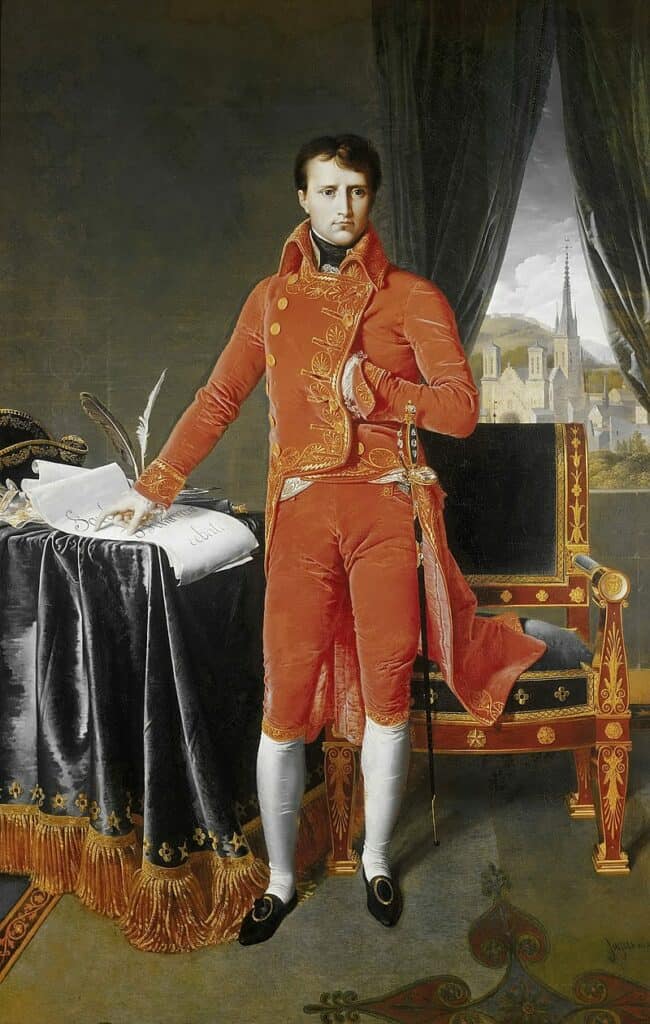
Napoleon as Consul - Napoleon was appointed the first consul in 1802, according to constitutional reform. In a magnificent ceremony held at the Parisian Cathedral of Notre Dame, Napoleon declared himself the Emperor of France in 1804, two years past his appointment.
REIGN
- The Napoleonic Wars were a series of significant confrontations between France and different coalitions of European countries that lasted from 1803 until 1815. Napoleon sold Louisiana Territory of France in North America for $15 million to the United States in 1803, a deal that ultimately came to be known as the Louisiana Purchase, in part to earn money for upcoming battles.
- During his time as ruler of France from 1799 to 1815, Napoleon Bonaparte introduced a range of reforms across various aspects of French society. These reforms aimed to centralise administration, standardise and simplify laws, promote meritocracy, and modernise the country's infrastructure.
- In terms of political reforms, Napoleon centralised the administration to make it more efficient and created the prefecture system to ensure greater control over the provinces in 1800. He established a constitutional monarchy, with himself as emperor, in 1804, and created the Legion of Honour, a system of awards for military and civilian service, in 1802. These reforms helped to strengthen the French government and promote loyalty to the state.
- Economically, Napoleon created the Bank of France in 1800 to stabilise the country's finances and promote industrialisation and modernisation. He invested in infrastructure projects, such as the construction of roads, bridges, and canals, to help facilitate trade and commerce. However, he also established the Continental System, a trade embargo against Britain, in 1806, which ultimately proved damaging to the French economy.
- Culturally, Napoleon promoted education by establishing public schools and universities in 1802. He also supported the arts, including the establishment of the Louvre Museum in 1801, and standardised the French language through the creation of the French Academy in 1803. These cultural reforms helped to promote national pride and a shared French identity among citizens.
- On the legal front, Napoleon introduced the Napoleonic Code in 1804, which standardised and simplified French law. This code abolished feudalism and the privileges of the nobility, and established equality before the law and religious tolerance. These legal reforms helped to reduce the power of the aristocracy and promote greater social and legal equality for all French citizens.
- Overall, Napoleon's reforms played a significant role in shaping France's political, legal, economic, and cultural landscape during his reign. While some of his policies were controversial and had long-lasting effects, such as the Napoleonic Code, others, like the promotion of education and the arts, continue to shape French society today.
- Napoleon's navy was completely destroyed by the British at the Battle of Trafalgar in October 1805. At the Battle of Austerlitz, which took place in December of the same year, Napoleon's army overcame the Russians and Austrians, earning it the reputation of being one of his greatest triumphs. The Confederation of the Rhine was founded after the victory, which caused the Holy Roman Empire to collapse.
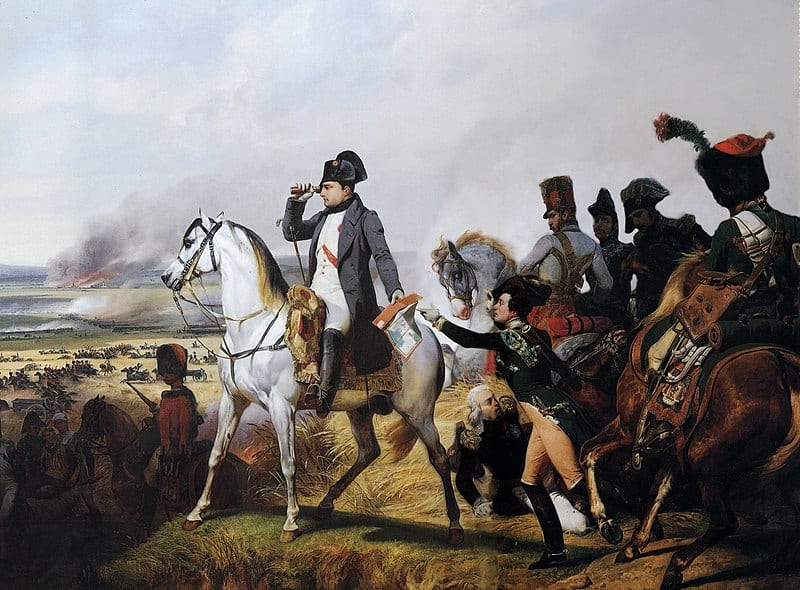
Battle of Wagram - With the implementation of the so-called Continental System of European port blockades against British trade beginning in 1806, Napoleon attempted to engage in extensive economic warfare against Britain. Alexander I was compelled to accept the Treaty of Tilsit in 1807 after Napoleon defeated the Russians at Friedland in Prussia. Napoleon gained further ground after the Battle of Wagram in 1809 when the French beat the Austrians.
- Russia left the Continental System in 1810. Napoleon launched a sizable force into Russia in the summer of 1812 as revenge. The Russians chose a tactic of fleeing anytime Napoleon's armies attempted to strike rather than fighting the French in full-scale combat. Napoleon's men then ventured farther into Russia despite being ill-equipped for a protracted conflict.
- The bloody Battle of Borodino in September resulted in significant deaths on both sides. When Napoleon's army arrived in Moscow, they found that practically the entire population had left. Russians who were fleeing lit fires all throughout the city to starve the German forces of supplies.
- Napoleon was compelled to send his starved, worn-out army out of Moscow after waiting a month for a capitulation that never materialised. This was because the Russian winter had begun. His army was continuously harassed by an unexpectedly aggressive and ruthless Russian force throughout the tragic withdrawal. Only around 100,000 of Napoleon's 600,000 soldiers who started the battle actually left Russia.
- French soldiers were fighting in the Peninsular War at the same time as the disastrous Russian invasion, which led to the Spanish and Portuguese and the British pushing the French out of the Iberian Peninsula. This was followed in 1813 by the Battle of Leipzig, also referred to as the Battle of Nations, in which a coalition of Austrian, Prussian, Russian, and Swedish armies destroyed Napoleon's soldiers. Following his withdrawal to France, allied armies conquered Paris in March 1814.
- Napoleon, who was then in his mid-40s, was forced to abdicate on 6 April 1814. He was banished to Elba, a Mediterranean island off the Italian coast, as a result of the Treaty of Fontainebleau. While his wife and kid travelled to Austria, he was granted control of the little island.
FINAL YEARS AND DEATH
- Napoleon left Elba and travelled to the French mainland with a party of more than 1,000 followers on 26 February 1815, less than a year after going into exile. On 20 March, he arrived back in Paris to a standing ovation from the populace. Louis XVIII, the newly installed monarch, escaped, and Napoleon launched his Hundred Days campaign.
- A coalition of allies — the Austrians, British, Prussians, and Russians — who viewed the French emperor as an adversary started waging war as soon as Bonaparte returned to France. Napoleon organised a new army and made plans to assault ahead of time, taking out the Allied forces one by one before they could fight him collectively.
- His armies occupied Belgium in June 1815, overrunning the country's British and Prussian soldiers. At the Battle of Ligny on 16 June, Napoleon's forces overcame the Prussians. However, two days later, the British defeated the French in the Battle of Waterloo near Brussels with the help of the Prussians. Napoleon was once more compelled to abdicate on 22 June 1815.
- Napoleon was banished to the hidden, British-controlled island of Saint Helena in the South Atlantic Ocean in October 1815. At age 51, he died there on 5 May 1821, most likely from stomach cancer. Napoleon frequently held his hand inside his vest while posing for portraits during his rule, which led to some posthumous claims that he had suffered from stomach agony for years.
- Napoleon requested to be buried "on the banks of the Seine, among the French people I have loved so much," but was instead placed on the island. In 1840, Napoleon's bones were repatriated to France and entombed in a vault at Les Invalides in Paris, where other French military commanders are buried.
Image Sources
- https://en.wikipedia.org/wiki/Battle_of_Waterloo#/media/File:Battle_of_Waterloo_1815.PNG
- https://en.wikipedia.org/wiki/Napoleon#/media/File:Jean_Auguste_Dominique_Ingres,_Portrait_de_Napol%C3%A9on_Bonaparte_en_premier_consul.jpg
- https://en.wikipedia.org/wiki/Battle_of_Wagram#/media/File:Napoleon_Wagram.jpg

